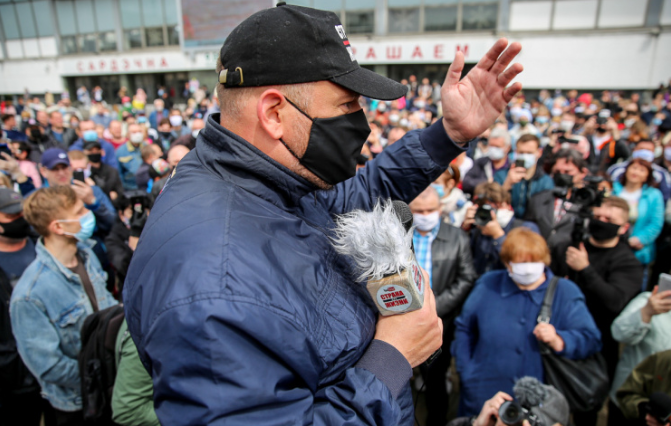Belarus is the world’s strangest state right now
The new epicentre of the COVID-19 pandemic in Europe, Belarus is seeing an unprecedented wave of civic participation amid the upcoming presidential election.
May 28, 2020 -
Yahor Azarkevich
-
Articles and Commentary

Popular video blogger Sergei Tikhonovsky at the signature gathering in Minsk.
Photo: Darya Buryakina. By courtesy of TUT.BY
On Sunday, many Belarusians came to the square in front of Minsk’s largest food market to endorse the presidential candidates Svetlana Tikhonovskaya and Vladimir Nepomnyashchikh – they had their first meeting to collect signatures. These were the so-called “protest candidates”, led by the increasingly popular video blogger Sergei Tikhonovsky and Mikola Statkevich, one of the leaders of Belarus’s conventional political opposition. Both of them have been recently denied registration as presidential candidates. For Tikhanovsky, this was because his documents lacked a personal signature which he couldn’t put due to the ongoing administrative arrest, while Statkevich was once imprisoned as one of the organisers of the 2010 mass protests. Although not officially on the list of candidates, Tikhanovsky is the head of his wife Svetlana’s team and Statkevich is heading the campaign of the retired MIA officer Nepomnyashchikh.
At the same day and in the same place, these two were joined by groups of supporters of the other two potential candidates: Viktor Babariko and Valery Tsepkalo (the politicians themselves were not there). Babariko is a philanthropist, patron of the arts and the ex-director of one of the largest banks in Belarus, Belgazprombank – the position he resigned from upon announcing his presidential bid. Tsepkalo is the former Deputy Minister of Foreign Affairs, Ambassador to the US and Mexico and the creator of Belarus Hi-Tech Park – the centre of the country’s new leading economic sphere. According to multiple opinion polls from the independent media, Babariko (especially), Tikhanovsky and Tsepkalo are leading the race for support with more than 80 per cent of its total share.
According to Tikhanovsky’s signatures count, at minimum three thousand people gathered at the Sunday meeting. This created a kilometre-long queue and left the attendants waitng for hours to document their support. During this week, pretty much the same scenario has repeated in Belarus’ other cities and towns. At the moment, these are kind of events completely unimaginable in most of the world’s states due to the restrictions caused by the COVID-19 pandemic. For Belarus, however, these are the events completely unimaginable at any given period of time before.
Despite the fact that no reliable opinion polls exist, it is no secret that for a long time now Lukashenka’s approval ratings have not been particularly high. Economic decline and political stagnation have led many of the incumbent president’s former supporters to turn on him. This was especially visible in 2006 and 2010, when mass protest occurred after rigged presidential elections. Such protests continued locally throughout the early, mid and late 2010s with various degrees of success, leading to an overall rise of civic engagement across the country.
Lukashenka’s reluctant response to the ongoing pandemic has seen his approval ratings drop to the all-time low. For the last month, Belarus has continuously ranked in Europe’s top five of countries by the daily increase in COVID-19 cases. Most recently, it made its way into the top three — right behind Russia and the UK. Numerous reports suggest that the official numbers diverge greatly even with internally distributed data, let alone the real figures. Currently, these numbers remain unknown due to a low-key testing policy.
Unsurprisingly, people in Belarus are scared of possible infection. Despite this, the government does not seem to be doing anything to help them cope. The country was the only post-Soviet state, apart from Turkmenistan, that did not skip the annual May 9th Victory Parade or cancelled major sport events. According to the Government Response Stringency Index, the only state that is taking fewer measures to fight the pandemic than Belarus is Nicaragua.
This difficult situation is perhaps responsible for the fact that Belarusians are now not scared to engage in politics. Overall, the country has seen very low political participation since 1994, with every election being nothing more than a bureaucratic routine. It would be naive to think that things will be any different this year, but a growing desire to engage with politics presents a great chance to transform the country. Apart from growing dissatisfaction with Lukashenka, factors such as the diversity of the candidates, their respectability and weight, as well as general demand for a change are contributing to such a shift. Truly, the situation is unprecedented.
There have never been candidates with such visible public support as Babariko, Tsepkalo and Tikhanovsky. There has never been such a high level of civic engagement compared to this year. Of course, there has never been a pandemic of this kind as the one this year. If the entire world seems surreal enough to you now, just look at Belarus — it is by far its strangest spot.
Yahor Azarkevich is a freelance journalist and an MA student at the University of Glasgow and Jagiellonian University in Kraków.
Dear Readers - New Eastern Europe is a not-for-profit publication that has been publishing online and in print since 2011. Our mission is to shape the debate, enhance understanding, and further the dialogue surrounding issues facing the states that were once a part of the Soviet Union or under its influence. But we can only achieve this mission with the support of our donors. If you appreciate our work please consider making a donation.

































